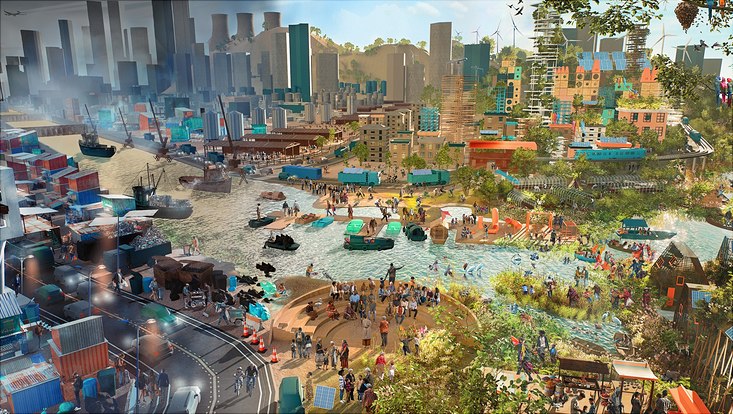and Natural Sciences
Research reveals path to prosperity for planet and people if Earth’s critical resources are better shared
12 September 2024, by MIN-Dekanat

Photo: Superflux, for the Earth Commission/Global Commons Alliance
New research published in “The Lancet Planetary Health” with contributions by the Department of Biology of Hamburg University shows that the planet will only remain able to provide even a basic standard of living for everyone in the future if economic systems and technologies are dramatically transformed and critical resources are more fairly used, managed and shared.
In this new work, the researchers made projections forwards to 2050, and found that the “Safe and Just Space” will shrink over time, unless urgent transformations are made. The researchers define “Safe and Just Space” as space within which harm to humans and nature can be minimised while everyone can be provided for.
For climate specifically they found that, if significant changes aren’t made now, by 2050 there will be no Safe and Just Space left. That means that even if everyone on the planet only had access to the resources necessary for a basic standard of living in 2050, the Earth will still be outside the climate boundary. Earth systems face the risk of crossing dangerous tipping points which would cause further significant harm to people around the world - unless energy, food and urban systems are urgently transformed.
They also found that inequalities and overconsumption of finite resources by a minority are key drivers of this shrinking. Providing minimum resources for those who don’t currently have enough would add much less pressure on the Earth system than that currently caused by the minority who use far greater resources.
The research also looked at where on the planet the Safe and Just boundaries have been breached, and overlayed this with people living in poverty who are exposed to harm from climate change, biodiversity loss, pollution and water shortages. The findings show that already vulnerable communities are often the most affected by Earth system change that impacts the health of people and ecosystems - but everyone, including the wealthy, is at risk.
"Safeguarding the biosphere means more than preserving nature, it is about making sure everyone, everywhere, has access to natural resources and their contributions to people to live a dignified life while protecting the ecosystems that support all. The ecosystems that sustain life through pollination, clean water and air, fertile soil, and climate regulation have already been pushed beyond safe and just boundaries”, says Dr. Awaz Mohamed, Postdoctoral Researcher at the Department of Biology at University of Hamburg and Co-Author. “Without urgent action, the safe and just space for both people and nature will shrink dramatically, exposing all people to the severe consequences of climate instability, biodiversity loss, and rising inequality. We must transform and rethink how we manage ecosystems to stay within safe and just Earth system boundaries, ensuring that biodiversity is preserved and natural resources and their contributions to people are shared equitably."
Urgent transformations required
The Safe and Just Space is the only remaining space rich in opportunities - in which people and the planet will remain able to thrive. To reach this space, the paper calls for change in three areas:
- Firstly, a well coordinated, intentional effort between policymakers, businesses, civil society and communities can push for changes to how we run the economy and find new policies and funding mechanisms that can address inequality whilst reducing pressure on nature and climate.
- Secondly, fundamental to the transformation is more efficient and effective management, sharing and usage of resources at every level of society - including addressing the excess consumption of some communities which is limiting access to basic resources for those who need them the most.
- Thirdly, investment in sustainable and affordable technologies is essential to help us use fewer resources and to reopen the Safe and Just Space for all - particularly where there is little or no space left.
Businesses and cities in particular have a leading role to play in reducing the pressure on the planet. By operationalising the Earth system boundaries and using them as a basis for science-based targets, they can become better stewards of Earth’s natural resources.
The report is co-authored by over sixty leading natural and social scientists from the Earth Commission - an international science commission hosted by Future Earth, and the scientific cornerstone of the Global Commons Alliance. The report builds on the Safe and Just Earth System Boundaries published in Nature last year, which found that most of the vital limits within which people and the planet can thrive have been surpassed.
Text: Earth Commission, red.
“Minimum access” measurement
Based on the Sustainable Development Goals, the researchers defined two levels of minimum access to key resources, including food, water, energy, basic shelter and transport.
Level 1 provides basic dignity, a low standard but slightly higher than the international poverty line.
Level 2 is slightly higher and provides basic living standards. This is the foundation of the Safe and Just Space and includes:
- a healthy diet (EAT-Lancet) 2500 cal/day
- 100 L of water/person/day for drinking, cooking, hygiene
- electricity for 16 h/day, incl. one high-power appliance, e.g. washing machine (0·7 kWh/capita/day)
- housing: living area 15m2
- transportation: up to 4500 passenger-km per year
Original publication
Gupta, Joyeeta et al. (2024) A just world on a safe planet: a Lancet Planetary Health–Earth Commission report on Earth-system boundaries, translations, and transformations, The Lancet Planetary Health, Volume 0, Issue 0.


